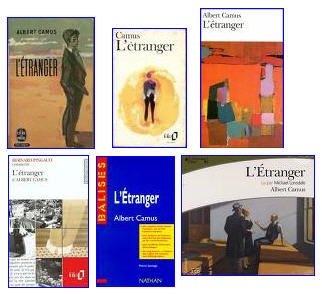Adventures on the Bookshelf is heading off on its summer holidays. Over the next few weeks, we’ll be picking out some recommended reading from our archives to keep you busy on the beach. We’ll be back with new posts from the first Wednesday in September.
 posted by Simon Kemp
posted by Simon Kemp
L’Étranger (usually translated as The Outsider) is probably the most widely read of all twentieth-century French novels. Marcel Proust’s A la recherche du temps perdu (In Search of Lost Time/Remembrance of Things Past) may be more famous, but not as many people get to the end of its 3000 pages. L’Étranger is short, intriguing, and written in such simple French (not a passé simple verb in sight) that it’s often the first choice for non-native-speakers wanting to try a real work of French literature in the original language. It’s the most-mentioned text on UCAS forms from prospective candidates by some margin — a fact that put me rather in two minds about including it in the book club. It’s already read by almost as many candidates as all other French literature put together, so it hardly needs my recommendation to find any more readers. But there is something special about its combination of accessible language and thought-provoking content that fully justifies its popularity.
The novel is set in colonial-era Algeria (it was written in the 1940s) , and the story is told by Meursault, a French-Algerian colonist. He likes warm sunshine and swimming in the sea. He doesn’t like damp towels in the bathroom. Most things he has no opinion on at all. ‘Ça m’est égal’ (‘I don’t mind either way’) is his constant refrain. He gets on with his life, enjoying small pleasures, and staying largely detached from other people. We meet him as he is told of his mother’s death and summoned to the old people’s home for her funeral. After that event, during which he smokes a cigarette by the coffin and sheds no tears at the graveside, we follow him on a trip to the beach with a girl, and through the events of an ordinary day.
Everything changes when Meursault is drawn into a feud between his disreputable neighbour, Raymond, and the family of Raymond’s Arab girlfriend, who is in an abusive relationship with him. Following a brawl at the beach with the girlfriend’s brother and other men, Meursault shoots one of them, in an act for which he offers no motivation other than that he was dazzled and disoriented by the sun.
The second half of the novel deals with Meursault’s trial. To Meursault’s bemusement (and here the novel takes on a slightly surreal air), the circumstances of the shooting are largely disregarded by the investigators and lawyers dealing with the case. Rather, it is Meursault’s behaviour during and after his mother’s funeral that attracts the interest, and condemnation, of the establishment. In their eyes, Meursault’s greatest crime is failing to weep at his mother’s funeral, further compounded by enjoying life in the days that followed. Meursault, we realize, is being condemned for not playing by society’s rules, and for refusing to play-act emotions he does not feel in order to make other people feel comfortable.
Meursault’s story is simply told. He gives us the facts of what is said and done, but offers few interpretations of his own or anyone else’s behaviour. The novel offers more questions than answers, and challenges the reader to take sides in a moral debate that’s not easy to settle (its hero is, after all, a killer without remorse, who’s also complicit in Raymond’s abuse of his girlfriend). It’s an uncomfortable read, deliberately provocative, and if you like being provoked then it’s well worth your time. It will also introduce you to the idea of the Absurd, the tragi-comic mismatch between our need to find meaning and purpose in life and the world we live in that often seems to have neither. It’s an idea that has a lot of influence on twentieth-century French literature, and is also explored, for example, in Samuel Beckett’s En attendant Godot and Jean-Paul Sartre’s La Nausée. So do go ahead and give Camus’s little masterpiece a try. But do also remember that Other French Novels Are Available.
